|
De Engelse schrijver Julian Barnes werd geboren op 19 januari 1946 in Leicester. Zie ook alle tags voor Julian Barnes op dit blog.
Uit: The Sense of an Ending
„I remember, in no particular order:
– a shiny inner wrist;
– steam rising from a wet sink as a hot frying pan is laughingly tossed into it;
– gouts of sperm circling a plughole, before being sluiced down the full length of a tall house;
– a river rushing nonsensically upstream, its wave and wash lit by half a dozen chasing torchbeams;
– another river, broad and grey, the direction of its flow disguised by a stiff wind exciting the surface;
– bathwater long gone cold behind a locked door. This last isn’t something I actually saw, but what you end up remembering isn’t always the same as what you have witnessed.
We live in time – it holds us and moulds us – but I’ve never felt I understood it very well. And I’m not referring to theories about how it bends and doubles back, or may exist elsewhere in parallel versions. No, I mean ordinary, everyday time, which clocks and watches assure us passes regularly: tick-tock, click-clock. Is there anything more plausible than a second hand? And yet it takes only the smallest pleasure or pain to teach us time’s malleability. Some emotions speed it up, others slow it down; occasionally, it seems to go missing – until the eventual point when it really does go missing, never to return.
***
I’m not very interested in my schooldays, and don’t feel any nostalgia for them. But school is where it all began, so I need to return briefly to a few incidents that have grown into anecdotes, to some approximate memories which time has deformed into certainty. If I can’t be sure of the actual events any more, I can at least be true to the impressions those facts left. That’s the best I can manage.
There were three of us, and he now made the fourth. We hadn’t expected to add to our tight number: cliques and pairings had happened long before, and we were already beginning to imagine our escape from school into life. His name was Adrian Finn, a tall, shy boy who initially kept his eyes down and his mind to himself. For the first day or two, we took little notice of him: at our school there was no welcoming ceremony, let alone its opposite, the punitive induction. We just registered his presence and waited.”
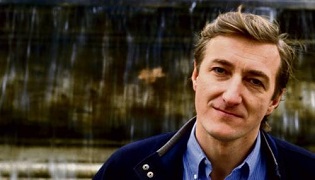
Julian Barnes (Leicester, 19 januari 1946)
De Amerikaanse dichter en schrijver Edgar Allen Poe werd geboren op 19 januari 1809 in Boston. Zie ook alle tags voor Edgar Allen Poe op dit blog
Sancta Maria
Sancta Maria! turn thine eyes -
Upon the sinner's sacrifice,
Of fervent prayer and humble love,
From thy holy throne above.
At morn - at noon - at twilight dim -
Maria! thou hast heard my hymn!
In joy and wo - in good and ill -
Mother of God, be with me still!
When the Hours flew brightly by,
And not a cloud obscured the sky,
My soul, lest it should truant be,
Thy grace did guide to thine and thee;
Now, when storms of Fate o'ercast
Darkly my Present and my Past,
Let my Future radiant shine
With sweet hopes of thee and thine!
Sonnet- Silence
There are some qualities- some incorporate things,
That have a double life, which thus is made
A type of that twin entity which springs
From matter and light, evinced in solid and shade.
There is a two-fold Silence- sea and shore-
Body and soul. One dwells in lonely places,
Newly with grass o'ergrown; some solemn graces,
Some human memories and tearful lore,
Render him terrorless: his name's "No More."
He is the corporate Silence: dread him not!
No power hath he of evil in himself;
But should some urgent fate (untimely lot!)
Bring thee to meet his shadow (nameless elf,
That haunteth the lone regions where hath trod
No foot of man,) commend thyself to God!
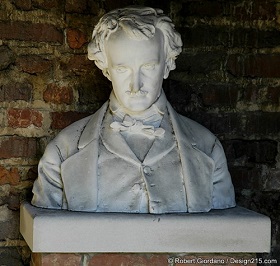
Edgar Allen Poe (19 januari 1809 – 7 oktober 1849)
Borstbeeld in het Poe museum in Richmond
De Amerikaanse schrijfster Edwidge Danticat werd geboren in Port-au-Prince op Haïti op 19 januari 1969. Zie ook alle tags voor Edwidge Danticat op dit blog.
Uit: The Dew Breaker
“My creative eye finds Manager Salinas’ office gaudy. The walls are covered with orange-and-green wallpaper, briefly interrupted by a giant gold leaf–bordered print of a Victorian cottage that resembles the building we’re in.
Patting his light green tie, which brings out even more the hallucinatory shade of his eyes, Manager Salinas reassuringly tells me, "Officer Bo and I will do our best."
We start out with a brief description of my father: "Sixty-five, five feet eight inches, one hundred and eighty pounds, with a widow’s peak, thinning salt-and-pepper hair, and velvet-brown eyes—"
"Velvet?" Officer Bo interrupts.
"Deep brown, same color as his complexion," I explain.
My father has had partial frontal dentures since he fell off his and my mother’s bed and landed on his face ten years ago when he was having one of his prison nightmares. I mention that too. Just the dentures, not the nightmares. I also bring up the blunt, ropelike scar that runs from my father’s right cheek down to the corner of his mouth, the only visible reminder of the year he spent in prison in Haiti.
"Please don’t be offended by what I’m about to ask," Officer Bo says. "I deal with an older population here, and this is something that comes up a lot when they go missing. Does your daddy have any kind of mental illness, senility?"
I reply, "No, he’s not senile."
"You have any pictures of your daddy?" Officer Bo asks.
My father has never liked having his picture taken. We have only a few of him at home, some awkward shots at my different school graduations, with him standing between my mother and me, his hand covering his scar. I had hoped to take some pictures of him on this trip, but he hadn’t let me.”
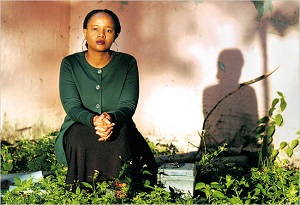
Edwidge Danticat (Port-au-Prince, 19 januari 1969)
De Oostenrijkse schrijver Gustav Meyrink werd op 19 januari 1868 te Wenen geboren. Zie ook alle tags voor Gustav Meyrink op dit blog.
Uit: Der Engel vom westlichen Fenster
„Sonderbares Gefühl: das verschnürte und versiegelte Eigentum eines Toten in der Hand zu halten! Es ist, als gingen feine, unsichtbare Fäden von ihm aus, zart wie Spinnengewebe, und leiteten hinüber in ein dunkles Reich.
Die Führung des oft verschlungenen Spagats, die sorgsame Faltung des blauen Umschlagpapiers darunter: das alles zeugt stumm vom zielvollen Denken und Handeln eines Lebendigen, der den Tod kommen fühlte. Der darum Briefe, Notizen, Schatullen, angefüllt mit einst Wichtigem, nun aber bereits Gestorbenem, vollgesogen mit Erinnerungen, die lange jetzt verweht sind, sammelt, ordnet, bündelt mit halben Gedanken an einen zukünftigen Erben, einen ihm fast fremden, fernen Menschen – an mich –, der von seinem Hingang wissen und ihn erfahren wird, wenn das geschlossene Bündel, verschollen im Reiche der Lebenden, den Weg in fremde Hand gefunden hat.
Die wuchtigen Rotsiegel meines Vetters John Roger sinds, die es verschließen, und sie tragen das Wappen meiner Mutter und ihrer Familie. Lang genug hatte dieser Mutter-Brudersohn bei Basen und Tanten schon 'der Letzte seines Stammes' geheißen, und dieses Wort klang in meinen Ohren immer wie ein feierlicher Titel hinter seinem ohnedies fremdartigen Namen, wenn es mit sonderbarem, ein wenig lächerlichen Stolz ausgesprochen wurde von den dünnen, verschrumpften Lippen, die rundum die letzten waren, einen abgestorbenen Stamm den Rest seines Lebens aushüsteln zu lassen.
Dieser Stammbaum – so wuchert das heraldische Wortbild weiter in meiner grübelnden Phantasie – hat seltsam verknorrte Äste über ferne Länder gestreckt. In Schottland hat er gewurzelt und überall in England geblüht; mit einem der ältesten Geschlechter in Wales soll er blutsverwandt gewesen sein. Kräftige Schossen faßten Boden in Schweden, in Amerika, zuletzt in Steiermark und in Deutschland. Überall sind die Zweige abgestorben; in Großbritannien verdorrte der Stamm. Einzig bei uns hier im südlichen Österreich schoß ein letzter Ast in Saft: mein Vetter John Roger. Und diesen letzten Ast hat – England erwürgt!”
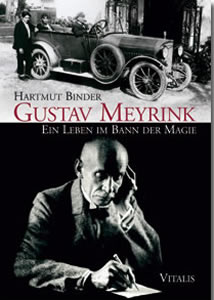
Gustav Meyrink (19 januari 1868 – 4 december 1932)
Cover biografie
De Portugese dichter Eugénio de Andrade (eig. José Fontinhas) werd geboren op 19 januari 1923 in Póvoa de Atalaia. Zie ook alle tags voor Eugénio de Andrade op dit blog.
Goats
Wherever the earth is crag and scrub, the goats are there—the black ones, girlishly skipping, leaping their little leaps from rock to rock. I’ve loved their nerve and frisk since I was small.
Once my grandfather gave me one of my own. He showed me how I could serve myself when I got hungry, from the full-feeling bags there like warmish wineskins, where I’d let my hands linger some before bringing my mouth close, so the milk wouldn’t go to waste on my face, my neck, even my naked chest, which did happen sometimes, who knows if on purpose, my mind dwelling all the while on the savory-smelling vulvazinha. I called her Maltesa; she was my horse; I could almost say she was my first woman.
Vertaald door Atsuro Riley
We zijn groene bladeren waarin vogels...
We zijn groene bladeren waarin vogels
slapen van schaduw en eenzaamheid.
We zijn slechts bladeren en hun geruis.
Onzeker, niet in staat om bloem te zijn,
tot de bries ons beroert en doet trillen.
Waardoor bij elk van onze bewegingen
iedere vogel een ander wezen wordt.
Vertaald door Toon Cappuyns en Germain Droogenbroodt
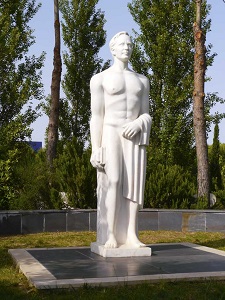
Eugénio de Andrade (19 januari 1923 – 13 juni 2005)
Beeld door Francisco Simões in het Parque dos Poetas in Oeiras
Zie voor nog meer schrijvers van de 19e januari ook mijn vorige blog van vandaag.
|



